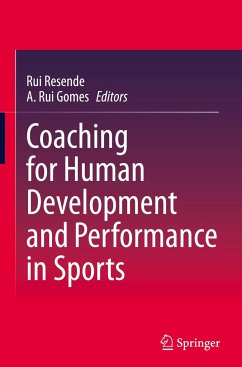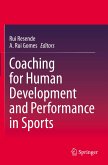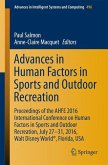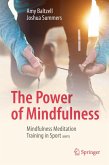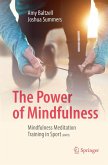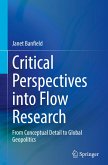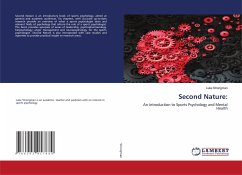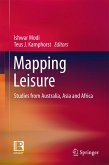Coaching for Human Development and Performance in Sports
Herausgegeben:Resende, Rui; Gomes, A. Rui
Coaching for Human Development and Performance in Sports
Herausgegeben:Resende, Rui; Gomes, A. Rui
- Gebundenes Buch
- Merkliste
- Auf die Merkliste
- Bewerten Bewerten
- Teilen
- Produkt teilen
- Produkterinnerung
- Produkterinnerung
This book addresses important topics of coaching in order to better understand what sports coaching is and the challenges that arise when assuming this activity. It provides the reader with useful insights to the field of sports coaching, and discusses topics such as coaching education, areas of intervention, and main challenges. With contributions by experts and well-known authors in the field, this volume presents an up-to-date picture of the scholarship in the coaching field. It introduces key aspects on the future of the science of coaching and provides coach educators, researchers,…mehr
Andere Kunden interessierten sich auch für
![Coaching for Human Development and Performance in Sports Coaching for Human Development and Performance in Sports]() Coaching for Human Development and Performance in Sports69,54 €
Coaching for Human Development and Performance in Sports69,54 €![Advances in Human Factors in Sports and Outdoor Recreation Advances in Human Factors in Sports and Outdoor Recreation]() Advances in Human Factors in Sports and Outdoor Recreation77,99 €
Advances in Human Factors in Sports and Outdoor Recreation77,99 €![The Power of Mindfulness The Power of Mindfulness]() Amy BaltzellThe Power of Mindfulness43,99 €
Amy BaltzellThe Power of Mindfulness43,99 €![The Power of Mindfulness The Power of Mindfulness]() Amy BaltzellThe Power of Mindfulness43,99 €
Amy BaltzellThe Power of Mindfulness43,99 €![Critical Perspectives into Flow Research Critical Perspectives into Flow Research]() Janet BanfieldCritical Perspectives into Flow Research100,99 €
Janet BanfieldCritical Perspectives into Flow Research100,99 €![Second Nature: Second Nature:]() Luke StrongmanSecond Nature:31,99 €
Luke StrongmanSecond Nature:31,99 €![Mapping Leisure Mapping Leisure]() Mapping Leisure39,99 €
Mapping Leisure39,99 €-
-
-
This book addresses important topics of coaching in order to better understand what sports coaching is and the challenges that arise when assuming this activity. It provides the reader with useful insights to the field of sports coaching, and discusses topics such as coaching education, areas of intervention, and main challenges. With contributions by experts and well-known authors in the field, this volume presents an up-to-date picture of the scholarship in the coaching field. It introduces key aspects on the future of the science of coaching and provides coach educators, researchers, faculty, and students with new perspectives on topics within the field to help improve their coaching effectiveness.
Produktdetails
- Produktdetails
- Verlag: Springer / Springer International Publishing / Springer, Berlin
- Artikelnr. des Verlages: 978-3-030-63911-2
- 1st edition 2020
- Seitenzahl: 488
- Erscheinungstermin: 19. März 2021
- Englisch
- Abmessung: 241mm x 160mm x 32mm
- Gewicht: 893g
- ISBN-13: 9783030639112
- ISBN-10: 3030639118
- Artikelnr.: 60397653
- Herstellerkennzeichnung Die Herstellerinformationen sind derzeit nicht verfügbar.
- Verlag: Springer / Springer International Publishing / Springer, Berlin
- Artikelnr. des Verlages: 978-3-030-63911-2
- 1st edition 2020
- Seitenzahl: 488
- Erscheinungstermin: 19. März 2021
- Englisch
- Abmessung: 241mm x 160mm x 32mm
- Gewicht: 893g
- ISBN-13: 9783030639112
- ISBN-10: 3030639118
- Artikelnr.: 60397653
- Herstellerkennzeichnung Die Herstellerinformationen sind derzeit nicht verfügbar.
Rui Resende is professor at the University Institute of Maia in Portugal. He is a Ph.D. from the University of Corunna in Sports Sciences and Master of High-Performance Sports from the University of Porto. He created and was coordinator of the Master's degree in Sports Coaching at the Maia University Institute. He was athlete and volleyball coach in all the competitive ranks, counting in his curriculum the direction of the national team in a juniors European Championship. He was a PE teacher for 23 years exercising numerous management positions at the school. He was president of the National Association of Volleyball Coaches of Portugal. He is editor in-chief of the Journal of Sport Pedagogy & Research and does research in the area of Sport Coaching and PE teachers counting with numerous articles, chapters of books and books edited in this area of research. He is Coach developer from the International Council for Coaching Excellence (ICCE). Rui Gomes is an Assistant Professor in the School of Psychology at the University of Minho, Portugal. He received his Ph.D. in Psychology from the University of Minho. He has research interests on human adaptation to stress, leadership and team performance, and training life skills and human performance. He leads the research group "Adaptation, Performance and Human Development", which was created in 2007 (www.ardh.pt). He leads the intervention project "School of Life Skills" (www.e-cv.pt). As a sport psychologist, he consults athletes and their families, coaches, and sport managers.
Chapter 1. Coaching: Definition and Conceptualization; John Lyle and Julian North.- Chapter 2. Coach Educaton: How Coaches Learn to Coach; Pierre Trudel, Michel Milisted and Diane Culver.- Chapter 3. Coach Efficacy: Setting the Philosophy of Coaching; Rui Gomes and Rui Resende.- Chapter 4. How to be an Effective Coach: An Interpersonal Approach; Jennifer Turnnidge, Veronica Allen and Jean Côté.- Chapter 5. Developing the Coach Developer; Masamitsu Ito and John Alder.- Chapter 6. Coaching Education around the World: Being a Professional; Sergio Lara Bercial and John Bales.- Chapter 7. Coach Professionn: Acting as a Coach; Paul Potrac and Cliff Mallett.- Chapter 8. Coaching Young Athlets; Gordon Bloom.- Chapter 9. Coaching Adult Athletes; Bettina Callary, Brad Young and Scott Rathwell.- Chapter 10. Coaching Professional Athletes; Steven Rynne.- Chapter 11. Coaching for Sport Participation; Rui Resende and Rui Gomes.- Chapter 12. Coaching for Aging; Tania Cassidy, Diana Culver and Bettina Callary.- Chapter 13. Coaching Athletes with Disabilities; Andrea Faull.- Chapter 14. Coaching for Adventures Sport; Vinicius Brasil and Valmor Ramos.- Chapter 15. Coaching Cohesive Teams; Todd M. Loughead.- Chapter 16. Coaching Life Skills in Sport; Martin I. Jones.- Chapter 17. Coaching and Gender Issues; Diana Culber and Guylaine Demers.- Chapter 18. Coaching Efficacy and the Use of Technology; Lee Nelson.- Chapter 19. Coach the Coach; Andy Gillham and Pete Van Mullem.- Chapter 20. Stress and Burnout in Coaching; Göran Kenttä.- Chapter 21. A Research Agenda for Studying Sports Coaching: Implications for Coaching Education and Practice.- Chapter 22. Research Agenda for Studying Sports Coaching: Implications for Research Design; Brett Smith.
Chapter 1. Coaching: Definition and Conceptualization; John Lyle and Julian North.- Chapter 2. Coach Educaton: How Coaches Learn to Coach; Pierre Trudel, Michel Milisted and Diane Culver.- Chapter 3. Coach Efficacy: Setting the Philosophy of Coaching; Rui Gomes and Rui Resende.- Chapter 4. How to be an Effective Coach: An Interpersonal Approach; Jennifer Turnnidge, Veronica Allen and Jean Côté.- Chapter 5. Developing the Coach Developer; Masamitsu Ito and John Alder.- Chapter 6. Coaching Education around the World: Being a Professional; Sergio Lara Bercial and John Bales.- Chapter 7. Coach Professionn: Acting as a Coach; Paul Potrac and Cliff Mallett.- Chapter 8. Coaching Young Athlets; Gordon Bloom.- Chapter 9. Coaching Adult Athletes; Bettina Callary, Brad Young and Scott Rathwell.- Chapter 10. Coaching Professional Athletes; Steven Rynne.- Chapter 11. Coaching for Sport Participation; Rui Resende and Rui Gomes.- Chapter 12. Coaching for Aging; Tania Cassidy, Diana Culver and Bettina Callary.- Chapter 13. Coaching Athletes with Disabilities; Andrea Faull.- Chapter 14. Coaching for Adventures Sport; Vinicius Brasil and Valmor Ramos.- Chapter 15. Coaching Cohesive Teams; Todd M. Loughead.- Chapter 16. Coaching Life Skills in Sport; Martin I. Jones.- Chapter 17. Coaching and Gender Issues; Diana Culber and Guylaine Demers.- Chapter 18. Coaching Efficacy and the Use of Technology; Lee Nelson.- Chapter 19. Coach the Coach; Andy Gillham and Pete Van Mullem.- Chapter 20. Stress and Burnout in Coaching; Göran Kenttä.- Chapter 21. A Research Agenda for Studying Sports Coaching: Implications for Coaching Education and Practice.- Chapter 22. Research Agenda for Studying Sports Coaching: Implications for Research Design; Brett Smith.

